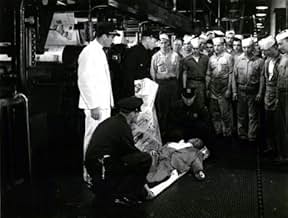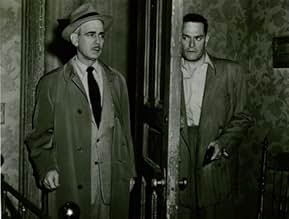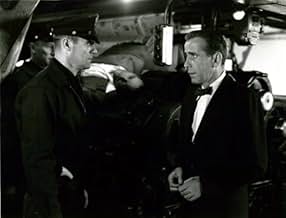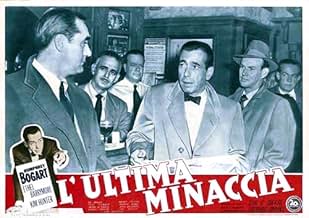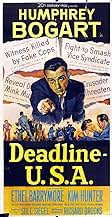PUNTUACIÓN EN IMDb
7,2/10
4,6 mil
TU PUNTUACIÓN
Con su periódico a punto de venderse, el editor Ed Hutcheson inicia una desesperada cruzada para denunciar al gángster Rienzi.Con su periódico a punto de venderse, el editor Ed Hutcheson inicia una desesperada cruzada para denunciar al gángster Rienzi.Con su periódico a punto de venderse, el editor Ed Hutcheson inicia una desesperada cruzada para denunciar al gángster Rienzi.
- Premios
- 2 premios en total
Joe De Santis
- Herman Schmidt
- (as Joseph De Santis)
Parley Baer
- Headwaiter
- (sin acreditar)
Bill Baldwin
- Man Asking for Ed Hutcheson
- (sin acreditar)
Willis Bouchey
- Henry
- (sin acreditar)
Lovyss Bradley
- Woman
- (sin acreditar)
John Brooks
- Reporter
- (sin acreditar)
Ralph Brooks
- Newspaperman
- (sin acreditar)
Reseñas destacadas
This film was released (as I remember) the same year as The African Queen. I have always liked it more than the latter film. Richard Brooks's prior experience working on a newspaper gives it a genuine idea of what that kind of work is like. The performances of Bogart and Barrymore are very good. I think it's one of her very best. This movie deserves to be seen and appreciated more.
The 40's and 50's had quite a few movies in which newspapers and newspapermen were the central focus. There was "Scandal Sheet," "Ace in the Hole," "It Happened Tomorrow," "Foreign Correspondent," "His Girl Friday," this movie, and others. I suppose it makes sense considering print media was the largest and most influential form of media with television a decade or so away from becoming the ubiquitous medium it is now.
Ed Hutcheson (Humphrey Bogart) was the editor of The Day, a thriving New York newspaper. The owner and founder had just died and The Day was being sold by the wife and the two daughters. Ed was giving it his all trying to do what he could to prevent the sale as well as continue to print relevant news. He dedicated all of his staff and resources to looking into a local mobster named Tomas Rienzi (Martin Gabel) when one of his reporters was hospitalized for digging up too much information on the same gangster. He thought maybe, just maybe, this story would both: expose a criminal and save the paper.
This was an ideologue movie. There were two stories running parallel to each other. One was the story of the gangster and his outsized influence, the other was the newspaper being sold to a competitor who was going to shutter it. The gangster story was a thrilling one, but the paper being sold was a principled one.
If The Day was sold to a competitor and then closed down, that would be one less voice for the people. It would be one less viewpoint, one less source of news, and one less competitor for the other papers. Such a thing couldn't be good for the reader and the average citizen. Market competition has always benefited the consumer (even though it's not benefiting us much nowadays with gas prices) while monopolies have always harmed the consumer.
This was a pivotal issue with The Day being sold, but it also directly confronted a person's or business's capitalistic right to sell their property. Should the courts prevent this sale based upon it taking away a source of news from your average citizen, what other sales would the courts be allowed to, or have to prevent? It was a novel argument that played out on screen and gave the viewer food for thought.
Free on YouTube.
Ed Hutcheson (Humphrey Bogart) was the editor of The Day, a thriving New York newspaper. The owner and founder had just died and The Day was being sold by the wife and the two daughters. Ed was giving it his all trying to do what he could to prevent the sale as well as continue to print relevant news. He dedicated all of his staff and resources to looking into a local mobster named Tomas Rienzi (Martin Gabel) when one of his reporters was hospitalized for digging up too much information on the same gangster. He thought maybe, just maybe, this story would both: expose a criminal and save the paper.
This was an ideologue movie. There were two stories running parallel to each other. One was the story of the gangster and his outsized influence, the other was the newspaper being sold to a competitor who was going to shutter it. The gangster story was a thrilling one, but the paper being sold was a principled one.
If The Day was sold to a competitor and then closed down, that would be one less voice for the people. It would be one less viewpoint, one less source of news, and one less competitor for the other papers. Such a thing couldn't be good for the reader and the average citizen. Market competition has always benefited the consumer (even though it's not benefiting us much nowadays with gas prices) while monopolies have always harmed the consumer.
This was a pivotal issue with The Day being sold, but it also directly confronted a person's or business's capitalistic right to sell their property. Should the courts prevent this sale based upon it taking away a source of news from your average citizen, what other sales would the courts be allowed to, or have to prevent? It was a novel argument that played out on screen and gave the viewer food for thought.
Free on YouTube.
Being the editor of a newspaper is intense, when the world outside your window don't make sense, where gangsters rule the roost, the owners easily seduced, an ex-wife who will not give you recompense. So we follow you around and watch you play, it's fair to say, that these are not ordinary days, always going toe to toe, they could be friends, they could be foes, but you ensure everyone, hears what you say. The performances are fine and competent, the emotion and the passion sufficient, not really sure the story's deep, there's not a lot of underneath, but it's 90 minutes that can be well spent.
"It's not our job to prove he's guilty. We're not detectives and we're not in the crusading business." That line from Humphrey Bogart early in the film lets you know you're watching a movie about a bygone era in journalism. Or maybe that's just an idealized fantasy and reporters were never like that, because later in the film Bogart contradicts himself by instructing his reporters to "go below the belt" and "we're gonna convict him of every crime on the books." Feelings on journalistic philosophy aside, this is an exceptional crime drama about the goings-on at a newspaper that's going out of business. Before the doors are closed, editor Bogart and his reporters try to uncover the truth about a racketeer's criminal activities.
Bogart turns in one of his finest acting turns, with terrific support from Ethel Barrymore, Martin Gabel, Ed Begley, Kim Hunter, Warren Stevens, Jim Backus, and many more. The story moves along at a smooth pace and keeps your interest throughout. There's quite a bit of monologuing but the script is packed with punch and grit. It's one of the better films in writer & director Richard Brook's career. It's worth a look on its merits as a dramatic film, as well as the added historic value it has for those looking to examine the differences and similarities between how journalism was viewed yesterday versus today.
Bogart turns in one of his finest acting turns, with terrific support from Ethel Barrymore, Martin Gabel, Ed Begley, Kim Hunter, Warren Stevens, Jim Backus, and many more. The story moves along at a smooth pace and keeps your interest throughout. There's quite a bit of monologuing but the script is packed with punch and grit. It's one of the better films in writer & director Richard Brook's career. It's worth a look on its merits as a dramatic film, as well as the added historic value it has for those looking to examine the differences and similarities between how journalism was viewed yesterday versus today.
Better than average newspaper drama from the Fifties. Seems to be a more or less forgotten Humphrey Bogart film, which is too bad. I couldn't find it on DVD anywhere, and watched it on a tape I made from cable ten or more years ago. The film has three intertwining plot arcs done very skillfully by screenwriter (and director) Richard Brooks. Martin Gabel plays the bad guy, a mobster who is suitably menacing, without overdoing it. Icon Ethel Barrymore puts in a fine turn as the newspaper heiress, and the lovely Kim Hunter shines as Bogey's ex-wife. Bogart is outstanding as the crusading newspaper editor, doing everything possible to save his paper, and bringing low the criminal element. Definitely worth seeing, if you can find it.
¿Sabías que...?
- CuriosidadesOriginally titled 'The Newspaper Story', location shooting took place both in the newsroom and the printing plant of The New York Daily News, with real pressmen playing themselves. This was augmented by an 'almost letter-perfect' reproduction of a newsroom on a Hollywood soundstage.
- PifiasAs Rienzi's car drives off after picking up Hutcheson, a large studio light is reflected against the side window of the car.
- Citas
[last lines]
Ed Hutcheson: That's the press, baby. The press! And there's nothing you can do about it. Nothing!
- ConexionesFeatured in El único juego en la ciudad (1970)
- Banda sonoraJohn Brown's Body
(uncredited)
Traditional tune, lyrics attributed to various writers
Sung, with modified lyrics, by the staff in the bar and heard as a theme at other times.
Selecciones populares
Inicia sesión para calificar y añadir a tu lista para recibir recomendaciones personalizadas
- How long is Deadline - U.S.A.?Con tecnología de Alexa
Detalles
- Fecha de lanzamiento
- País de origen
- Sitios oficiales
- Idiomas
- Títulos en diferentes países
- La hora de la venganza
- Localizaciones del rodaje
- Empresa productora
- Ver más compañías en los créditos en IMDbPro
Taquilla
- Recaudación en todo el mundo
- 5228 US$
- Duración1 hora 27 minutos
- Color
- Relación de aspecto
- 1.37 : 1
Contribuir a esta página
Sugerir un cambio o añadir el contenido que falta

Principal laguna de datos
By what name was El cuarto poder (1952) officially released in India in English?
Responde

